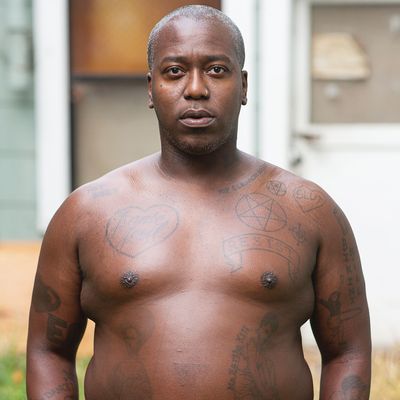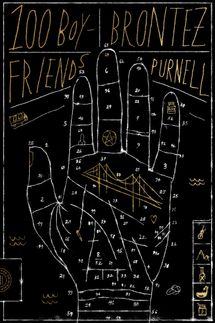
Fuck boyfriends. Forget borrowed sweaters and airport pickups. The men in Brontez PurnellÔÇÖs book 100 Boyfriends exist on a subterranean layer of the slightly disreputable ÔÇö fuck buddies, side pieces, daddies, hookers, johns. 100 Boyfriends is a taxonomy of the wild and tender relationships native to the terroir of gay culture ÔÇö the kind seeded in bathrooms, on street corners, and in gym showers long before Lin-Manuel Miranda ever said ÔÇ£Love is love is love is love ÔǪÔÇëÔÇØ In PurnellÔÇÖs short story ÔÇ£Mountain Boys,ÔÇØ the narrator calls attention to the bookÔÇÖs title: ÔÇ£I called them ÔÇÿboyfriends,ÔÇÖ though this was not always the case. But they were all like pieces of bubblegum you chew hours after the flavor leaves and that you accidentally swallow, and then (supposedly) sit in your guts for seven years.ÔÇØ
And so Purnell is spitting them all out in what FSG Originals has billed as a ÔÇ£novel-in-stories,ÔÇØ divided into three acts and an epilogue, each made up of discrete tales bound by a common sentiment. There isnÔÇÖt a single narrator, but PurnellÔÇÖs work tends to operate from a semi-autobiographical space. Born and raised in a small town in Alabama, he self-actualized through punk music and contemporary dance, acquiring a following in the Bay Area as the riot boi among the riot grrrls in the mid-aughts. He started a zine called Fag School, in the grand tradition of the xeroxed cut-and-paste, which eventually led him to write books, including 2015ÔÇÖs Johnny Would You Love Me If My Dick Were Bigger, published by the underground press Rudos and Rubes. 100 Boyfriends, his first book with a major publisher, is more polished and assured than his previous work, and, like Johnny Would You Love Me, it draws its DNA from Fag SchoolÔÇÖs ÔÇ£Cruising Reviews.ÔÇØ Context matters, though: In the zine, the cruising reviews could be wedged between porn reviews and a photo-comic of Purnell fucking his bandmate in a strip entitled Young ÔÇÖnÔÇÖ Hung. The look was DIY and dirty, the posture anti-Establishment. Compared to the zine, 100 Boyfriends feels gussied up, as though it put on a clean shirt and good shoes before guests arrived.
100 Boyfriends front-loads its best work into the first two acts, ÔÇ£Army of LoversÔÇØ and ÔÇ£100-Page Breakup Letter.ÔÇØ PurnellÔÇÖs observations are at once lyrical and familiar, like a perfect joke dropped into a group text or whispered into a loverÔÇÖs ear. ThereÔÇÖs boyfriend No. 19, the white boy whose dreadlocks felt ÔÇ£like a nest of spiders,ÔÇØ and the Satanist, boyfriend No. 666, whose ÔÇ£stroke game was at about 58 percent.ÔÇØ Then thereÔÇÖs the on-again, off-again relationship in ÔÇ£Damn a Lover Comes Home to Die.ÔÇØ The narratorÔÇÖs man is an addict who comes back to him only when heÔÇÖs coming down, and he can never say no. In a gorgeous scene, the boyfriend once again returns post-bender, and the narrator changes him into freshly bought Champion sweats ÔÇö ÔÇ£because I want to wrap him in expensive thingsÔÇØ ÔÇö and puts a cold compress on his head, saying, ÔÇ£You are going to behave yourself. You are going to come back to me.ÔÇØ
While PurnellÔÇÖs sensibility is queercore, his writing follows the oft-unacknowledged literary subgenre of cruising ÔÇö a more contemporary, gay variant of fl├ónerie: the men who wander for dick, from Jean Genet to David Wojnarowicz to Samuel R. Delany. The public square winks with possibility. Gas stations become libidinal pump-and-dumps. Bathrooms, bathhouses, truck stops, theaters, warehouses, and docks peel back to reveal entire erotic ecosystems structured around giving and getting orgasms. ÔÇ£The great thing about anonymous sex is you donÔÇÖt bring your private life or personal world,ÔÇØ said the late artist and poet John Giorno, whose collection You Got to Burn to Shine includes a story about exchanging blow jobs with someone who turns out to be Keith Haring in the toilets of the Prince Street subway station. ÔÇ£No politics or inhibiting concepts, no closed rules or fixed responses. The great thing about anonymous sex is spontaneity.ÔÇØ
Writing in this genre has usually held a romantic view of cruising. Whether it happened in pre-Giuliani Times Square (depicted in DelanyÔÇÖs masterful anthropology Times Square Red, Times Square Blue) or at the bar called the Magic Touch in Jackson Heights (in Jos├® Esteban Mu├▒ozÔÇÖs Cruising Utopia), the belief is that public sex reorganizes the world in a way that allows for a radical reconception of desire. That tapping foot could belong to a trucker or a senator. Delany holds such spaces in awe and channels their otherworldliness into his science fiction. In his 1988 memoir, The Motion of Light in Water, he remembers the nighttime orgies that would occur between the tractor-trailers parked at the docks on Christopher Street:
At other times, to step between the waist-high tires and make your way between the smooth or ribbed walls was to invade a space at a libidinal saturation impossible to describe to someone who has not known it. Any number of pornographic film-makers, gay and straight, have tried to portray something like it ÔÇö now for homosexuality, now for heterosexuality ÔÇö and failed because what they were trying to show was wild, abandoned, beyond the edge of control, whereas the actuality of such a situation, with thirty-five, fifty, a hundred all-but-strangers is hugely ordered, highly social, attentive, silent, and grounded in a certain care, if not community.
Purnell, who is 38, shares an affinity for the old-school, pre-Grindr era of sex ÔÇö but with less utopian sentiment. He respects a transcendent sluthood. And yet as 100 Boyfriends goes on, the energy and care that sustain its first two sections peter out in its third, ÔÇ£No New Boyfriends,ÔÇØ which is composed mostly of brief sketches of sexual encounters. IÔÇ»found myself hungering for Purnell to identify the blocks, whether personal or sociological, that obstruct his protagonists, as in the screed he delivered in the first issue of Fag School. ÔÇ£We here at FAG SCHOOL tend to lean towards the specific belief that shit has REALLY hit the fan,ÔÇØ he wrote then. ÔÇ£These days, straight dudes look like faggots, faggots are zombies, and the only people whoÔÇÖll hit on you and truly MEAN IT are old dudes at the library. TOTAL BUMMER. We here at FAG SCHOOL also believe that in times such as these we have to separate ourselves from this smelly, SMELLY bullshit and get to the real nitty-gritty.ÔÇØ
Sex doesnÔÇÖt have to mean anything, but novels should and itÔÇÖs not clear what 100 Boyfriends amounts to in the aggregate. The paragraph-long snippets begin to feel repetitive. They blur together, as casual sex is wont to do. (There are only so many sexual positions under the sun.) What are we left with at the end of it all? Certainly not marriage (thank God). ThereÔÇÖs desire itself, an unslakable thirst. ÔÇ£My only desire is to be desired,ÔÇØ one of PurnellÔÇÖs narrators thinks to himself. ÔÇ£I can (at will) rip out all sense of self just so a boy can have one more hole to fuck me in.ÔÇØ I craved that level of sustained intensity ÔÇö back blown out, mind empty ÔÇö as I read toward a climax that never quite arrived.
*This article appears in the February 1, 2021, issue of New York Magazine. Subscribe Now!


